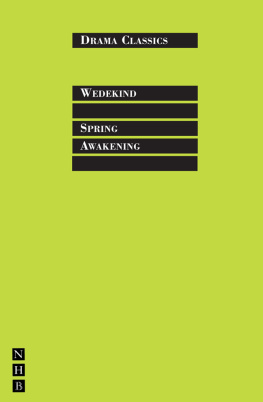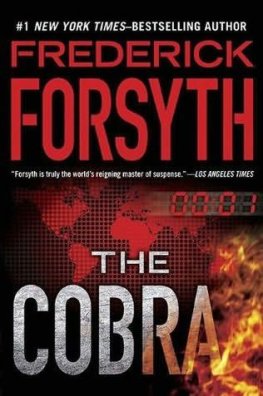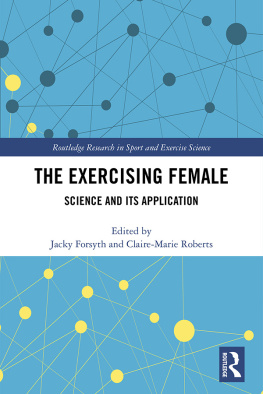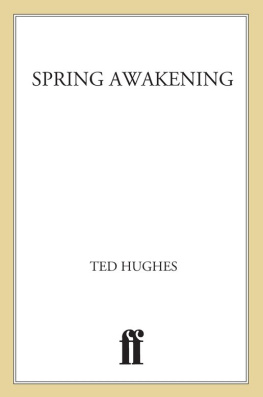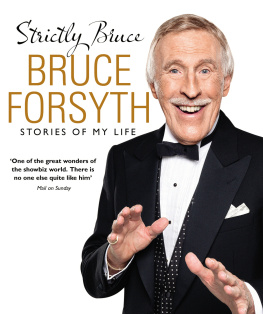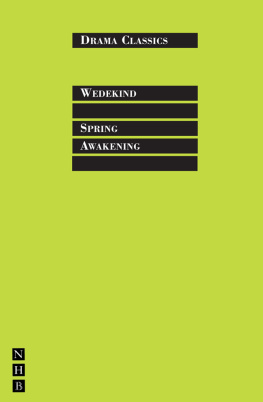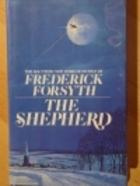Forsyth Julian - Spring Awakening
Here you can read online Forsyth Julian - Spring Awakening full text of the book (entire story) in english for free. Download pdf and epub, get meaning, cover and reviews about this ebook. City: London, year: 2010, publisher: Perseus Books, LLC;Nick Hern, genre: Detective and thriller. Description of the work, (preface) as well as reviews are available. Best literature library LitArk.com created for fans of good reading and offers a wide selection of genres:
Romance novel
Science fiction
Adventure
Detective
Science
History
Home and family
Prose
Art
Politics
Computer
Non-fiction
Religion
Business
Children
Humor
Choose a favorite category and find really read worthwhile books. Enjoy immersion in the world of imagination, feel the emotions of the characters or learn something new for yourself, make an fascinating discovery.
- Book:Spring Awakening
- Author:
- Publisher:Perseus Books, LLC;Nick Hern
- Genre:
- Year:2010
- City:London
- Rating:5 / 5
- Favourites:Add to favourites
- Your mark:
- 100
- 1
- 2
- 3
- 4
- 5
Spring Awakening: summary, description and annotation
We offer to read an annotation, description, summary or preface (depends on what the author of the book "Spring Awakening" wrote himself). If you haven't found the necessary information about the book — write in the comments, we will try to find it.
Spring Awakening — read online for free the complete book (whole text) full work
Below is the text of the book, divided by pages. System saving the place of the last page read, allows you to conveniently read the book "Spring Awakening" online for free, without having to search again every time where you left off. Put a bookmark, and you can go to the page where you finished reading at any time.
Font size:
Interval:
Bookmark:

DRAMA CLASSICS
SPRING AWAKENING
by
Frank Wedekind
translated and introduced by
Julian and Margarete Forsyth

NICK HERN BOOKS
London
www.nickhernbooks.co.uk
Contents
Introduction
Frank Wedekind (18641918)
Playwright, satirist, actor, cabaret singer, terror of the German bourgeoisie and, in Bertolt Brechts words, one of the great educators of modern Europe, Benjamin Franklin Wedekind was conceived in California, born in Hanover and christened in honour of his parents courtship in the Land of the Free. His mother Emilie (ne Kammerer) was a young singer at the German theatre in San Francisco whose reputed beauty and talent were matched by her independent spirit. She had sailed alone from Germany aged sixteen to join her married sister in Chile, surviving a rape attempt on the way. En route to a new life in California, she had buried her sister at sea when she succumbed to yellow fever, and then taken on the burden of supporting her in-laws with her earnings as a performer. The German physician in San Francisco who treated her for exhaustion promptly fell in love with his young patient. Dr Friedrich Wilhelm Wedekind was an idealistic, radical democrat, who had emigrated to the States after the failure of the 1848 revolution in Germany and made a fortune in land speculation during the gold rush. The fact that he was also twenty-four years older than Emilie was, son Franklin observed later, not entirely devoid of significance. A condition of their marrying was that his young wife give up her stage career.
The marriage appears to have been fraught, with the husband suffering frequent bouts of jealousy. The couplereturned to Germany but, disillusioned once more with politics under Bismarck, the doctor uprooted his young family again to Switzerland, where he purchased an isolated castle on a hill, thus extricating his wife from the attentions of flirtatious young men, and Franklin and his elder brother from future conscription to the new Imperial Army. It was here, retired from practice and increasingly eccentric and withdrawn, that Dr Wedekind lived out his life in the castles upstairs quarters like the Prussian landed gentry he had despised in his youth, stamping on the floor whenever he needed attention.
To Franklin, his mother seemed like a living rebuke to the prudish pieties of German-Swiss small-town life. When not arguing spiritedly with her husband, Emilie devoted her energies to managing the castle and initiating her six children (Franklin being number two) into the bohemian world of her past. She encouraged them to put on music-hall acts and little plays in which she was a keen participant. Her profound influence on him was aided and abetted by some interesting female friends. Olga Plmacher, a self-taught philosopher with a published book on Schopenhauer, engaged the teenage boy in pessimistic discussions and became his philosophical aunt. With Bertha Jahn, a widow twenty-five years his senior who looked very much like his mother, he almost certainly developed a less platonic relationship, dubbing her his erotic aunt.
Franklin the American, as he was known at school, agreed to study law at his fathers behest. It soon became apparent that he was neglecting his studies to pay regular visits to theatres. When his father confronted him, Franklin declared his intention of becoming a writer. He and his father came to blows, his allowance was stopped, and he was forced toleave home for Zurich. There he took on a variety of jobs, including writer of jingles for the newly established Maggi Soup and Spice Company, and a stint as secretary to a travelling circus an experience which would influence much of his later writing. Otherwise he eked out a living contributing articles, poems and sketches to the Zurich press while trying his hand at playwriting. His diaries record with relish his erotic adventures, mainly with prostitutes with at least one of whom he had a more or less stable relationship but also betray his early concerns about impotency (Piccolo is docile. I cant think whats the matter with him).
Zurich was a haven for German expatriate writers fleeing restrictive censorship at home. It was here that Wedekind fell in with the Young Germany movement of liberal writers and scientists and its literary leader, the Naturalist playwright Gerhart Hauptmann. He soon fell out with them again, and not only because of his impatience with Naturalism as a genre. He had confided in Hauptmann about his parents rocky marriage and his guilt at striking his own father, and the playwright promptly worked these details into a play with the subtitle A Family Disaster. An outraged Wedekind took revenge with a play of his own about womens emancipation, The World of Youth, which featured a writer (clearly based on Hauptmann) who goes through life with a notebook and pencil noting down everything that may one day be of use. The line with which Wedekind twisted the knife is spoken by the plays most articulate female character: When Naturalism has had its day, its practitioners can earn a living in the secret police.
Financial struggles and a grovelling letter to his father led to reconciliation and resumption of his legal studies, but within a few months his fathers sudden death left him witha modest inheritance and the chance to pursue his literary ambitions full time. He wrote Spring Awakening, which he subtitled A Childrens Tragedy, at the age of twenty-six in 1890-91. He published it at his own expense, well aware that in the conservative moral climate of the time there was little chance of performance for a play that dealt so candidly with the subject of puberty. It was fifteen years before Germanys leading theatre director Max Reinhardt decided to risk it in Berlin.
By then, Franklin now calling himself plain Frank had achieved considerable fame or, to some, notoriety. As the star performer of The Eleven Executioners, a political cabaret in Munich, he sang cynical ballads to the guitar about seduced virgins, murdered aunts, and the pleasures of free love. As major contributor to the popular satirical magazine Simplicissimus, he served a nine-month prison sentence for two scurrilous poems about the Kaiser. And with a steady job at last as a theatre dramaturg, he wrote the Lulu plays Earth Spirit and Pandoras Box, which chart the career of a childlike femme fatale through a succession of lovers who meet violent deaths. She ends as a prostitute in Victorian London, murdered with her lesbian companion by her last client, Jack the Ripper. Both plays were repeatedly rejected and banned before being finally printed and staged in club performances in the early 1900s, with Wedekind himself playing Jack the Ripper. He also played Lulus third husband Dr Schn, whom she shoots five times in the back before declaring that he is the only man she has ever loved.
In Pandoras Box this femme fatale was played by the nineteen-year-old Tilly Newes. In 1906, the year of Spring Awakenings premiere, she and Frank were married. She was twenty-two years his junior. He proposed after Tilly made a suicideattempt, jumping in a river in the dead of winter when pregnant with his child. She was to try again a decade later, taking mercury in despair at his unfounded jealousies. As his plays achieved greater recognition and toured throughout Germany, he made her give up her independent acting contract so she could appear on stage only with him. While his wife had something of his mothers vivacious personality, Frank found his fathers paranoia and eccentricity re-emerging in himself in modified form. Male visitors to the Wedekind apartment would be directed to a strategically placed armchair, find themselves staring at a nude portrait of Tilly, and try to hide their discomfort under the beady eye of the host. One family friend recalled Franks curious domestic persona as a disconcerting mixture of artistic gipsy and pedantic
Font size:
Interval:
Bookmark:
Similar books «Spring Awakening»
Look at similar books to Spring Awakening. We have selected literature similar in name and meaning in the hope of providing readers with more options to find new, interesting, not yet read works.
Discussion, reviews of the book Spring Awakening and just readers' own opinions. Leave your comments, write what you think about the work, its meaning or the main characters. Specify what exactly you liked and what you didn't like, and why you think so.

